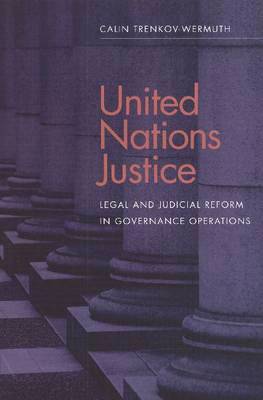
- Retrait gratuit dans votre magasin Club
- 7.000.000 titres dans notre catalogue
- Payer en toute sécurité
- Toujours un magasin près de chez vous
- Retrait gratuit dans votre magasin Club
- 7.000.0000 titres dans notre catalogue
- Payer en toute sécurité
- Toujours un magasin près de chez vous
United Nations Justice
Legal and Judicial Reform in Governance Operations
Calin Trenkov-WermuthDescription
For the past decade the United Nations has attempted to administer justice in territories placed under its executive authority--an undertaking for which there was no established precedent or doctrine. Examining the UN's legal and judicial reform efforts in Kosovo and East Timor, this volume argues that rather than helping to establish a sustainable legal system, the organization's approach detracted from it. Justice standards were sacrificed for the sake of prosecutions and the legal vacuum was not filled effectively. The desire to create functioning courts exceeded the UN's efforts to deal with detainees. Local ownership was erroneously regarded as a means to the end of achieving a sustainable legal system. And the UN's adoption of rights standards unsuited to the circumstances led it to break its own laws. As a result, instead of easing key tensions at the heart of governance operations, the UN's approach aggravated them.
Dr. Calin Trenkov-Wermuth and his colleagues offer the first full account of the UN's administration of justice in governance operations. He also suggests methods to improve on its efforts. The book will be of interest to academics and practitioners in international law, political science, ethics and applied philosophy, and transitional justice.
Spécifications
Parties prenantes
- Auteur(s) :
- Editeur:
Contenu
- Nombre de pages :
- 304
- Langue:
- Anglais
Caractéristiques
- EAN:
- 9789280811735
- Date de parution :
- 30-03-10
- Format:
- Livre broché
- Format numérique:
- Trade paperback (VS)
- Dimensions :
- 152 mm x 229 mm
- Poids :
- 368 g

Les avis
Nous publions uniquement les avis qui respectent les conditions requises. Consultez nos conditions pour les avis.






